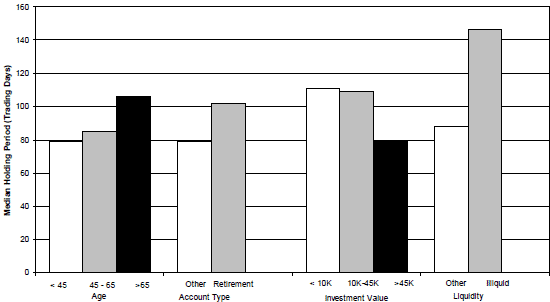Do individual investors vary stock trading behavior according to the friction associated with trading? In his May 2010 paper entitled “Liquidity Clienteles: Transaction Costs and Investment Decisions of Individual Investors”, Deniz Anginer investigates the relationship between position holding period and trading friction (stock illiquidity) and the effect of this relationship on net investment performance. Using data from a large discount brokerage firm encompassing two million trades of 66,000 households over the period 1991-1996, he concludes that:
- The average (median) holding period for a stock is 185 (86) trading days. The median holding period is longer for stocks held in retirement accounts, for investors who are older and for less wealthy investors. Holding periods are notably longer for illiquid stocks. (See the chart below.)
- Controlling for household and stock characteristics, trading friction relates positively to position holding period overall.
- Defining sophistication based on education and resources, the trading friction-holding period relationship is strongly positive for more sophisticated investors but negative for less sophisticated investors.
- Households with longer holding periods earn significantly higher net returns, and households with holding periods that relate positively to trading frictions earn higher gross and net returns.
- Households with higher incomes and with larger stock holdings supply liquidity when market liquidity is low.
The following chart, taken from the paper, shows the median holding periods for closed positions segmented by investor age, account type (retirement or not), value of stock account and stock liquidity. Illiquid stocks are the 10% of stocks with the lowest liquidity. It shows that investors tend to hold illiquid stocks (with higher trading frictions) substantially longer than liquid stocks, thus amortizing trading costs over longer periods.

In summary, evidence indicates that sophisticated investors appear to recognize the importance of trading friction to net return and gauge holding periods accordingly.
Might the submergence of trading frictions for individual stocks into “liquid” exchange-traded funds alter the trading friction-holding period calculus?